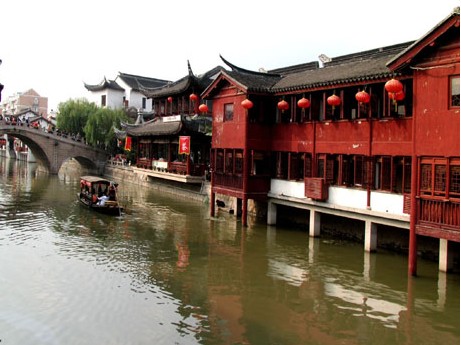
Life in shanghai can sometimes feel a bit like chaos – traffic noises, flashing neon, skyscrapers jutting into the air – so it’s good to know about places close by where you can escape the commotion of the city. One such place is Qibao Ancient Town, about 18 kilometers from downtown Shanghai. Wandering the streets, it’s easy to forget that one of the world’s biggest, noisiest cities lies just a short distance away.
Qibao is steeped in history. The town was built about a thousand years ago during the Five Dynasties Period. It developed during the Song Dynasty and flourished during the Ming and Qing eras. In Chinese, ‘qibao’ means ‘seven treasures’, referring to and old story which originated in the area. Legend has it that there were seven precious things there – a gold lotus scripture written by a 10th century imperial concubine, a magic tree, a big bell, a golden cock, a Buddha, a jade chopstick and a jade axe. Only the lotus scripture and the bell have survived to this day.
Today the old town is about two square kilometers in size, and is intersected by two water lanes. Around these canals are many well-preserved houses, traditional gardens, temples, shops and restaurants which contribute to Qibao’s charm.
A must-see is the old street in the heart of town – old Shanghai in a nutshell. It has been restored to its original look, consisting of southerly and westerly sections. The southern part is jam-packed with old and new restaurants serving all sorts of tasty snacks – a miniature paradise for gourmets. The western end of the street is home to old shops selling arts, crafts, antiques and calligraphy, as well as the Qibao pharmaceutical store, a thousand-year-old shop, some quaint tea houses and shadow puppet theaters.
The strata of Qibao’s history can be seen in the various sections of the town. The time-worn stone roads and narrow lanes are pure Song Dynasty, while the temples, gardens, pavilions and houses hark back to the Ming and Qing Dynasties with their black-bricked walls and elegantly-decorated tiles.
Some other places worth seeing are the Cricket Hall, Tian Xian g Restaurant with its authentic local cuisine, and the Qibao Theater where you can sample some distinctive Shanghainese opera.
So if you need a break from Shanghai’s fast pace, head to Qibao and see for yourself why it is a treasure both by name and by nature.
Related News
Photos
More>>Top 5 Lists
destinations
attractions
- Panda Xing Bang s Memorial Volume Made Public for the First Time
- Meilan, a panda at the Chengdu Panda Base, to be the Earth Hour Global
- Chengdu lit up 24 Kong Ming Lanterns to support the conservation action for
- Class of Panda Action for Water Start
- Panda Xing Bang is Arranged to Come Back from Japan Next Week





